- Home
- Antony Trew
Death of a Supertanker Page 2
Death of a Supertanker Read online
Page 2
Malim had nodded vigorously. ‘You’re right. It is that. But this is a new ship. For Christ’s sake, what does he expect? Bound to be teething troubles. Anyone can make a mistake. That’s no excuse for persecution. He’s made my life a bloody misery.’
Now, on his way up to the chief engineer’s office, Malim stopped on a landing for a moment to recover his composure. He tried to recall how it had all started. He’d been in the control-room when the breakdown occurred. The alarm systems had given absolutely no warning that the bearing was about to fail. That was typical of his luck. Things always seemed to go wrong in his watch. This was by no means the first time there’d been a breakdown in it, though before it had been auxiliary machinery and not the main engines. But Ocean Mammoth was a new ship and troubles were inevitable. Why didn’t McLintoch make allowances for that? The tension between them was no secret. The Chief had on two previous occasions shouted at him in front of other engineer officers, and except for Jerry Whitelot there wasn’t, he knew, much sympathy for him. It was not for nothing, he reflected, that his shipmates had corrupted his Jonathan to ‘Jonah’.
Malim was a very worried young man. McLintoch would not only hold him responsible for the breakdown, but would probably submit a written report to the Captain about the incident in the control-room. One way and another he was bound to come off worst. Gloomy, introspective, with few friends, he felt helpless and insecure. As so often happened when he was under stress, the muscles in his stomach contracted and his head throbbed.
‘Take a seat, Mr Malim.’ The chief engineer was a very formal, proper sort of person, who seldom used first names. He cleared his throat and regarded the third engineer sternly. ‘I have an unpleasant duty to perform.’ He spoke in an awkward, hurried way.
Malim looked up. There were little pools of sweat in the pouches under his troubled eyes. ‘I expected this, Chief. And I apologize for losing my temper.’ He shrugged his shoulders. ‘There was no warning whatsoever. The alarm system failed …’
McLintoch held up a hand much in the manner of a policeman on point duty. ‘It’s not that, Mr Malim. It’s personal news. Your wife …’ He stopped then to give the younger man time to sense what was coming.
‘My wife?’ Malim’s apprehensive eyes lifted again to meet the chief engineer’s. ‘What about her? It’s not …’ His voice trailed away, but it was apparent from the way the muscles in his face worked that he was beginning to understand.
The chief engineer stood up, went round the desk and laid a hand on his shoulder. ‘Road accident, laddie.’ It occurred to him that he’d never called him that before. ‘She was crossing the street. A car ran into her.’
The third engineer blinked as if he’d been struck in the face. He was silent for a moment, running his tongue over his lower lip. ‘She is … she was … five months pregnant.’ He fell forward on to the desk, head on hands, his shoulders shaking.
Despite his reserved manner and quick temper, McLintoch was a warm-hearted man. Conscious that his relationship with the third engineer had for some time been under severe strain; that he, McLintoch, had provoked the undignified and absurd row in the control-room, he felt a personal sense of guilt as if he were in some way responsible for Mrs Malim’s death. With an awkward rather self-conscious gesture he patted the young man’s shoulder. ‘She knew nothing, laddie. Killed instantly the message said.’
Malim pushed the chief engineer’s hand away, pulled himself together, got out of the chair and left the office without a word.
At 1830 the Seahorse, then thirty-seven miles distant, spoke to the tanker by voice radio. The two captains discussed details of the tow, the manner in which it would be passed and secured, agreed that the weather conditions were good and signed off. Not long afterwards the tug’s steaming lights were sighted.
Captain Crutchley was informed and at once went to the bridge. Cadet Middleton was already there. The ship’s floodlights had turned night into day and those on the bridge, looking along the vast maindeck could see, far ahead in the bows, a party of men making ready for the tow. With them was the chief officer whose place on the bridge had been taken by Foley. The Captain had discussed with the chief officer what was to be don and had every confidence it would be well done. Freeman Jarrett was a capable man, good at handling crew and dealing with emergencies. It was a pity, thought Crutchley, as he moved out to the port wing, that the chief officer so often talked of leaving the sea. Bad for morale, particularly among the junior officers and cadets. He shrugged away the thought and spoke to Middleton. ‘How is the tug bearing now?’
The cadet moved the azimuth ring round the gyro-repeater and put his eye to it. ‘Two-seven-three, sir.’
‘Good,’ said the Captain. ‘Now remember that bearing, Middleton. If it does not change we’re on a collision course. Since she is making for us and we are stationary it should not change.’
‘Yes, sir.’
With the cadet following closely, the Captain went back to the wheelhouse and moved along the bridge consoles until he reached the radar units. ‘Now, Middleton, check that bearing on the anti-collision radar and get the tug’s distance.’
While the Captain was speaking the chief officer arrived in the chartroom. He walked past Foley who was at the chart-table and stopped at the break of the screen separating chartroom from wheelhouse. There, in semi-darkness, he watched the Captain and Middleton. The cadet was leaning forward, looking into the display hood of the AC radar, his hand on the range switch. A moment later he reported, ‘Bearing two-seven-four, distance fifteen miles, sir.’
‘The ship’s head?’
‘One-eight-eight, sir.’
The chief officer moved up alongside the Captain. ‘We’re all ready up forward, sir,’ he said. ‘Shouldn’t be any problems in this weather.’
Captain Crutchley continued to look straight ahead. ‘Thank you, Mr Jarrett. The tug should be with us soon.’
Jarrett hesitated. ‘Would you like Middleton to come forward with me, sir? Good practical experience.’
‘No,’ said Crutchley. ‘You already have Cadet Price. Middleton will remain on the bridge. There’s plenty for him to profit from up here.’
Jarrett said nothing but in the darkness he looked at the Captain in a speculative way, as if trying to read his mind.
Chapter 3
The night was dark when shortly before seven, Seahorse arrived and without delay manoeuvred her stern under Ocean Mammoth’s bows. Lines were passed, a three-inch wire messenger from the tug was taken to a winch-drum on the tanker’s windlass, and the work of winching it in began. It would be followed by the main towing wire; a heavy nine-inch rope of tensile steel.
The chief officer stood in the bows on the starboard side of the towing fairlead. He was in touch with both the supertanker’s bridge and the salvage tug by R/T walkie-talkie. Cadet Price was to port of the fairlead with a standby set. The Seahorse’s stern was now a couple of hundred feet ahead of the bows of the tanker.
‘Belay winching,’ warned the salvage tug’s captain by R/T. ‘The eye of the nine-inch has just gone into the water. I’ll move ahead another half-cable and take up the slack on the messenger. Don’t begin winching again until I give the word.’
‘Okay, Seahorse,’ replied Jarrett. ‘Message received and understood.’ He called to the men at the capstan. ‘The tug’s going to move another half-cable ahead. Take a turn off the winch-drum and be ready to let that wire surge handsomely if necessary.’ The men at the capstan acknowledged, the tug moved dead slow ahead, one of her searchlights trained on the bight of wire which was just beginning to show on the surface.
Moments later the man tending the wire on Ocean Mammoth’s winch-drum lost control as he took the turn off and let the wire run. It fouled a deck fitting, jammed and parted, one end whipping to port with a crack like a rifle shot. It struck Cadet Price’s legs and hurled him over the side.
Jarrett at once broadcast, ‘Man overboard, port bow.’ He passed his R/T set to t
he bosun and ran across to the port side. The sea beneath the tanker’s bows was lit by the tug’s searchlight and in its beam, far below, he saw the crumpled heap in the water.
He grabbed a heaving line, secured the inboard end to a stanchion, and threw the coil over the side. Climbing on to the bulwark he lowered himself down the line, controlling his descent with gloved hands. When he reached the water he let go, got rid of the working gloves and his shoes and swam the thirty yards or so to where the lifeless shape bobbed in the sea.
He gripped the body, turned it on to its back and lifted the head clear of the water. A life-buoy splashed close by, but Jarrett ignored it. He was a strong swimmer, the Indian Ocean was agreeably warm, he was enjoying his role, and he knew that more practical help was not far away.
A few minutes later an inflatable skimmer from the Seahorse arrived with a sound like tearing linen and picked up both men. Before long they were back on board Ocean Mammoth.
It was close to nine-thirty when the tow was finally passed and secured and Seahorse, barely making way through the water, moved to starboard on a course almost at right angles to the line of Ocean Mammoth’s keel. The salvage tug was pivoting the supertanker to avoid a direct pull against the enormous inertia of the ship at rest. The long towing wire took the strain, lifted from the sea momentarily, a quivering arc from which water streamed like liquid silver in the beam of the searchlight. There was no danger now of the wire parting; the tug’s winches were self-adjusting for tension and would render before breaking point was reached.
With infinite care and patience the tanker’s bows were coaxed round. Then, gently but surely, Seahorse showed her strength and the big ship began to move ahead almost imperceptibly. As way was gained, the tug began a slow turn on to the course for Durban.
Foley had picked up the helicopter on radar long before they saw its lights blinking in the distance. It came steadily towards them and when they heard the sound of its jets floodlights were switched on and men went forward to the white-circled landing area. The helicopter came in close, rotor blades shimmering, jets screaming, and stationed itself above and to port of the maindeck.
The batman waved his neon wands, the helicopter crabbed sideways and hovered for a moment before dropping on to the deck. The rotors kept turning, the dimension lights blinking, as a door slid open. Two men stepped out, bending low and running clear. Soon they reappeared, accompanied by crewmen carrying Cadet Price in a Skyclimber stretcher. It was loaded into the helicopter, the doctor and his assistant got in, the batman waved his wands and the machine lifted away in a steep climbing turn, the roar of its jets and the beat of its rotors a noisy reminder of technology’s importance to Cadet Price’s survival.
It was after four o’clock in the morning when Foley got down to his cabin, having been relieved by Jarrett. He found his wife in the day-cabin, propped up on the settee reading Cosmopolitan, a magazine of which he did not approve because he felt it gave her ideas she’d have been better without. But since he was dominated by a desire to please her, to hold her at almost any cost, he’d not made an issue of this; any more than of her extravagances and ambitions – ambitions quite incapable of fulfilment by him.
Foley was very much in love with his wife but uncertain of their relationship which to him seemed insecure. She was, he knew, an unwilling passenger in Ocean Mammoth. It had taken much persuasion to get her to come: only the knowledge that they had let their flat for six months and would save money – half of which would be hers – had clinched the deal.
He was twenty-six, she twenty-eight. They’d been married for five years and there were no children. Her favourite taunt during heated arguments was: ‘I should never have married you. You caught me on the rebound.’ The rebound was, he knew, the result of an unhappy love affair with a married man. Foley’s perpetual nightmare was that there would be another love affair, when he was away at sea. At those times he would acknowledge the mistake he’d made in marrying a woman so attractive, intelligent and ambitious.
The moment he entered the cabin and saw her lying on the settee in black bra and pants, her body deeply sun-tanned – she spent hours each day beside the tanker’s pool – he’d felt the irresistible pull of her sexual attraction.
‘Hullo,’ he said. ‘Still awake. I thought you’d be in bed.’
She put down the magazine. ‘I’m not tired. Too much excitement. The breakdown, the tug coming out. Peter Price’s rescue. The helicopter. And now the tow. It’s dreamy. And weeks in Durban to come. You always told me what a super place it was. Isn’t that marvellous?’ Her eyes shone. ‘What time do we get there?’
‘I’m glad. That’s great, Sandy. I told you interesting things could happen in a supertanker.’ He laughed happily. ‘Our ETA is 0830 – another four hours. But we’ll be at anchor for two or three days before we can go in.’ He stooped over the settee, gave her a long kiss, his hands exploring the sun-tan. ‘We’ve lots of time‚’ he whispered into her hair.
She pushed him away gently. ‘No, George. Not now. Please. I want to talk. There’s so much to talk about.’ She sat up suddenly, folded her arms round her knees and looked up at him with dark intense eyes. ‘Tell me. How’s the tow going? How was poor Peter Price when they took him off?’
He forgot his disappointment. It was difficult not to respond to her enthusiams. No one could be a more interesting and affectionate companion if she chose. He sighed, slumped into an easy chair, clasped his hands behind his head. ‘The tow’s going well. Making a steady seven knots.’ He yawned noisily. ‘Sorry. I’m tired. Been on the bridge for more than ten hours.’
‘Tired? Poor George.’ She looked at him in an absent-minded way. ‘But tell me about Peter Price. How was he when he went?’
‘Sorry. I forgot. Pretty bad. Both legs broken by that wire. Probably some internal injuries too. His back got it when he was thrown against the bulwark. And he was half-drowned. Jarrett gave him a shot of morphine soon after they got him back on board. He was still out when they put him in the helicopter.’
‘Poor boy. He’s lucky to be alive, isn’t he? If it weren’t for Freeman Jarrett he wouldn’t be. Wasn’t that marvellous, George? So brave. Plunging in like that. In uniform and knowing the Indian Ocean’s alive with sharks. At night, too.’
George Foley raised a querulous eyebrow. ‘Brave? You must be joking. Sea calm and warm, ship stopped, tug close by, the place lit like Piccadilly Circus.’ He made a rude noise. ‘And uniform … for God’s sake … he was wearing tropical kit … shorts and shirt … what could be better. No plunge about it either. Lowered himself down on a heaving line.’ Foley sat upright in the chair to lend emphasis to what he was saying. ‘And all for what? The tug was there, wasn’t it? They’d have had Price on board in no time.’
She smiled knowingly, a contrived smile which she knew irritated him. ‘You’re jealous, George. It was brave. And quick and decisive like Freeman always is. That boy would have drowned by the time the tug’s skimmer got there.’
Foley sensed a row coming, tried to check himself but couldn’t. The bravery of Freeman Jarrett, real or imaginary, was not a subject he was prepared to keep quiet about. ‘Rubbish, Sandy. No risk at all. Pure exhibitionism. He loved it. Typical Jarrett scenario. He ought to have been on the stage.’
‘My God, you are jealous, George.’ She frowned, made a face. ‘It’s a nasty characteristic. Freeman is an outstanding man. Everyone knows it. He’ll be in command soon. Master of his own ship. You mark my words. And only thirty-two.’
Foley stared at her. ‘You married the wrong man, didn’t you? Well, let me remind you that Jarrett can’t wait to leave the sea. Always telling us the great things he plans to do ashore. The city tycoon. Financial whizz kid extraordinary. You must have heard him laying that on the line.’
‘Maybe he will be a tycoon. He’s the sort of man who would succeed at anything he puts his mind to.’
Foley shrugged his shoulders. He’d had his say. She always had to have the last
word. He was too tired to argue. He could have pointed out that he had an Extra Master’s Certificate – the highest qualification for a deck officer in the Merchant Navy – whereas Jarrett hadn’t. But she knew that, and would only be sarcastic if he mentioned it. He picked up his shoes and went through to the sleeping cabin. He disliked Freeman Jarrett intensely. Their relationship was one of continuing tension. The chief officer, secure in his seniority, tended to bear down on him. What Foley found particularly humiliating was his wife’s admiration for Jarrett who in turn made it clear that he found her attractive.
What Foley didn’t know was that she saw the chief officer as a romantic figure, tall and handsome in a ruggedly masculine way. A dashing, debonair, somewhat reckless man, in a sense indispensable, since he made bearable the monotony of a tanker voyage in the company of people she didn’t really care for. And he was divorced, which made him even more interesting from her point of view.
The Seahorse arrived off Durban with her tow during the forenoon of the following day, and with the assistance of two harbour tugs manoeuvred Ocean Mammoth into the anchorage recommended by the Port Captain. Seahorse and one of the harbour tugs then re-entered the port, leaving the other to stand by the anchored ship until such time as she was able to use her engines. To motorists along the Marine Parade, and others looking out to sea that morning, the ships at anchor were so dwarfed by the huge bulk of the supertanker that they seemed to have shrunk overnight.

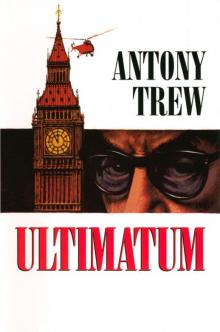 Ultimatum
Ultimatum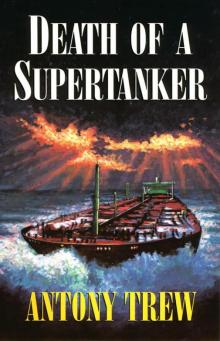 Death of a Supertanker
Death of a Supertanker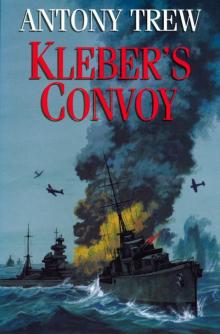 Kleber's Convoy
Kleber's Convoy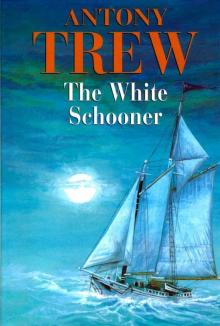 The White Schooner
The White Schooner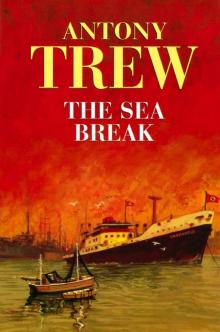 The Sea Break
The Sea Break